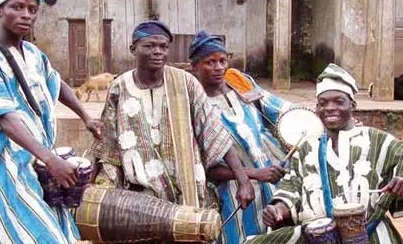
support@yorubalibrary.com
+2348073529208, 07038599574

In Yoruba communities, music is more than an art form; it is an essential educational tool. Through songs, the Yoruba people pass down knowledge, cultural values, and life skills from one generation to the next. Music is used to teach language, history, moral values, and social norms, making it a vital component of the educational process in Yoruba culture.
The Role of Music in Yoruba Education
Music plays a multifaceted role in Yoruba education, serving as a medium for storytelling, memory enhancement, and moral instruction. It is woven into daily life and is present in ceremonies, festivals, and informal gatherings, providing opportunities for learning in various contexts.
Teaching Language and Oral Tradition
Yoruba music is instrumental in teaching the Yoruba language and preserving oral traditions. Through songs and chants, children learn the nuances of the language, including pronunciation, intonation, and vocabulary. Traditional folk songs and lullabies often incorporate proverbs and idiomatic expressions, enriching the linguistic repertoire of young learners.
Examples of Educational Songs
• Counting Songs:
Songs that teach numbers and counting are commonly used in early childhood education.
• Alphabet Songs:
These songs help children learn the Yoruba alphabet and improve their literacy skills.
• Storytelling Songs:
Songs that narrate folktales and historical events provide a fun and engaging way to learn about Yoruba culture and history.
Music and Moral Education
Yoruba music is a powerful tool for imparting moral values and ethical principles. Songs often convey lessons about respect, honesty, hard work, and community solidarity. By embedding moral teachings in music, these values become memorable and resonate deeply with listeners.
The Use of Proverbs in Music
Proverbs are an integral part of Yoruba music, offering wisdom and guidance. Musicians use proverbs to emphasize moral lessons and provoke thoughtful reflection. This method of teaching encourages individuals to internalize values and apply them in their daily lives.
Music in Formal Education
In formal educational settings, music is used to enhance learning and stimulate cognitive development. Schools incorporate music into the curriculum to support subjects such as mathematics, science, and social studies.
Benefits of Music in Education
• Improved Memory: Music aids in memory retention and recall, making it an effective tool for learning and memorization.
• Enhanced Creativity: Engaging with music fosters creativity and critical thinking skills.
• Emotional Development: Music encourages emotional expression and helps students develop empathy and social awareness.
Community Music Programs
Community music programs play a crucial role in providing educational opportunities for children and adults. These programs often focus on teaching musical skills, cultural knowledge, and community values.
Examples of Community Music Initiatives
• Choirs and Ensembles:
Participation in choirs and musical ensembles provides opportunities for collaboration, discipline, and cultural expression.
• Drumming Circles:
Drumming circles are popular in Yoruba communities, offering a hands-on way to learn rhythm, coordination, and teamwork.
• Cultural Festivals:
Festivals celebrate Yoruba music and culture, providing a platform for learning and community engagement.
Conclusion
Music is a fundamental tool for education in Yoruba communities, offering a dynamic and effective way to teach language, culture, and values. By integrating music into both formal and informal educational settings, the Yoruba people ensure the preservation and transmission of their rich cultural heritage. As an educational tool, music continues to inspire and empower individuals, fostering a deeper connection to their roots and a greater understanding of the world around them.

The unique styles of Yoruba Bata and Dundun dances…

The emergence of new age social media and impact i…